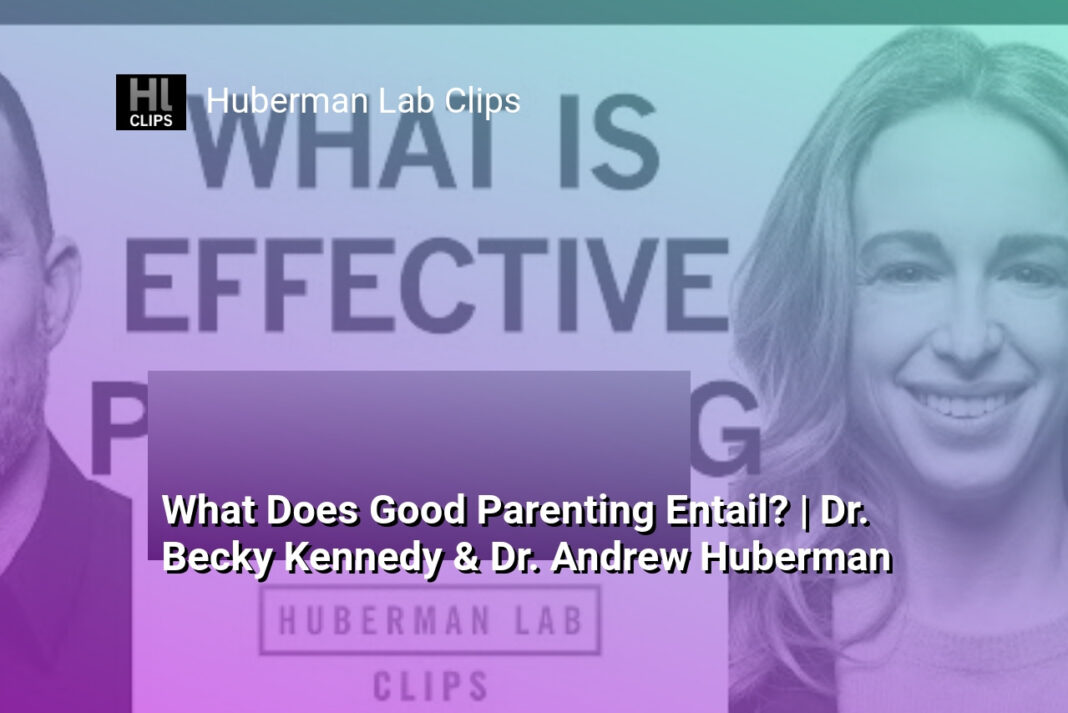The Bottom Line:
- In this discussion, the speaker reflects on the concept of being a good parent, exploring the idea of “sturdiness” in relationships and the specific roles and responsibilities of parents.
- The speaker emphasizes the importance of having a clear understanding of one’s job as a parent, drawing a parallel to the need for a job description in any other professional setting.
- The speaker identifies two key aspects of a parent’s job: setting boundaries to keep the child safe and provide structure, and practicing empathy and validation to connect with the child’s emotional experience.
- The speaker highlights the importance of maintaining a sense of self while also connecting with the child, avoiding the pitfalls of codependency or merging of identities.
- The discussion explores the concept of “sturdiness” in relationships, which the speaker describes as the ability to be connected to oneself and to another person simultaneously, a key characteristic of healthy relationships.
The Meaning of Sturdiness in Relationships
Maintaining Boundaries and Empathy in Healthy Relationships
In the context of parent-child relationships, the concept of “sturdiness” is crucial. Sturdiness encompasses the ability to be connected to oneself while also connecting with another person, even if their wants, needs, and values may differ. This delicate balance is at the heart of a healthy relationship.
The Dual Roles of Parents
As parents, we have two primary responsibilities that contribute to this sturdiness. The first is setting and maintaining boundaries. Boundaries are the things we communicate to others about what we will and will not do. They represent our values, wants, and needs, and they serve to keep both ourselves and our children safe. Importantly, boundaries differ from mere requests, as they do not require the other person to do anything.
The second responsibility is to provide empathy and validation. This involves recognizing and acknowledging the feelings and experiences of our children, even if we do not necessarily agree with or condone the behaviors that stem from those feelings. Connecting with our children’s emotional states, while still upholding our boundaries, is the essence of a sturdy, healthy relationship.
The Importance of Self-Awareness
One of the key challenges in parenting is that many well-intentioned and educated individuals struggle to articulate their specific job responsibilities. Just as we would not accept a job without a clear job description, we cannot expect to excel as parents without understanding our core duties. By recognizing that our role involves both boundary-setting and empathetic connection, we can strive to be the sturdy, reliable leaders our children need.
The Two Jobs of Effective Parenting: Boundaries and Empathy
Maintaining Boundaries and Fostering Empathy
As parents, we have two crucial responsibilities in nurturing healthy relationships with our children. The first is establishing and upholding boundaries. Boundaries are the guidelines we set that define what we will and will not do. They represent our values, needs, and desires, and they are essential for maintaining our connection to ourselves. In the parent-child dynamic, boundaries also serve to keep our children safe.
For example, if we know our children have had enough screen time for the day and it’s time for them to go to bed, we need to set that boundary. We are communicating our family’s needs and expectations, not making a request. Boundaries keep us grounded in our role as parents and ensure our children’s wellbeing.
The second part of our job as parents is to cultivate empathy and validation. This involves recognizing and acknowledging our children’s feelings, even if we don’t agree with or condone the behaviors that stem from those emotions. Empathy is about connecting with our children’s experiences and perspectives, not necessarily endorsing them.
By balancing boundaries and empathy, we can become the sturdy, reliable leaders our children need. Boundaries keep us true to ourselves and our values, while empathy allows us to bridge the gap and foster a deeper understanding between parent and child. This delicate balance is the foundation of a healthy, resilient parent-child relationship.
The Importance of Maintaining a Distinct Self
Closely related to the concept of boundaries is the notion of maintaining a distinct sense of self within the parent-child relationship. It’s important to avoid the pitfall of becoming overly enmeshed or codependent, where the lines between parent and child become blurred.
In a healthy relationship, both the parent and the child have a clear sense of their own identity, values, and needs. They are able to see each other as separate individuals, not just extensions of themselves. This “other-other” dynamic, as it’s sometimes called, allows for mutual respect, autonomy, and the development of healthy interdependence.
When a parent and child become too merged, it can lead to a lack of individuality and an unhealthy level of reliance. The child may struggle to develop their own sense of self, and the parent may find it difficult to set appropriate boundaries or maintain their own needs and identity.
By cultivating a sturdy, semi-permeable relationship, where both parties can be true to themselves while also connecting deeply, we can foster the kind of resilient, healthy parent-child dynamic that sets our children up for success.
The Importance of Clarity in Parental Roles
One of the key insights you shared is the importance of having a clear understanding of our roles and responsibilities as parents. In many other professional contexts, we would never accept a job without a detailed job description. Yet, when it comes to parenting, many well-intentioned and educated people struggle to articulate what their specific duties and objectives are.
This lack of clarity can make it incredibly challenging to perform our roles effectively and achieve the outcomes we desire for our children. By clearly defining the two primary jobs of effective parenting – establishing boundaries and fostering empathy – we can provide a solid foundation for our interactions with our children.
When faced with challenging situations, such as a child’s tantrum, rude behavior, or dishonesty, having a clear understanding of our parental responsibilities can guide our responses. We can draw upon the dual pillars of boundaries and empathy to navigate these moments with confidence and consistency.
By embracing this framework and continuously refining our approach, we can become the sturdy, reliable leaders our children need. This clarity of purpose, combined with the delicate balance of holding firm boundaries and cultivating empathetic connections, is the key to building healthy, resilient parent-child relationships.
Maintaining a Sense of Self in Parent-Child Relationships
Maintaining a Sense of Self in Parent-Child Relationships
Establishing healthy boundaries is crucial in parent-child relationships. As a parent, one of your primary responsibilities is to set clear boundaries that keep your child safe and secure. These boundaries represent your values, wants, and needs, and they help you stay connected to yourself. It’s important to understand that boundaries are things you tell people you will do, and they require the other person to do nothing. This distinction is crucial, as many parents mistake requests for boundaries.
Alongside setting boundaries, the other essential aspect of your job as a parent is to show empathy and validation. This means recognizing and acknowledging your child’s feelings and experiences as valid, even if you don’t agree with the behavior that stems from those feelings. By connecting with your child’s emotional state, you demonstrate that you see them as a separate individual with their own sense of self.
This balance between maintaining your own boundaries and empathizing with your child’s perspective is the foundation of a sturdy, healthy parent-child relationship. It allows you to be a sturdy leader, one who is connected to both yourself and your child simultaneously. This sturdiness, as you described it, is not about being rigid or unyielding, but rather about the ability to remain true to your own values and needs while also being attuned to your child’s.
Nurturing a Separate Sense of Self
Fostering a sense of separate self in parent-child relationships is crucial for healthy development. As you mentioned, the concept of “other-other” relationships, where both individuals maintain their own sense of self, is the opposite of codependency. In a codependent relationship, one person’s sense of self becomes intertwined with the other, leading to a lack of individuality and autonomy.
In the context of parent-child relationships, it’s important to avoid this merging of identities. While it’s natural for parents and children to feel a deep bond, it’s essential that the child is able to develop their own sense of self, separate from their parent. This allows the child to explore their own interests, values, and decision-making processes, ultimately leading to a more well-rounded and resilient individual.
Balancing Boundaries and Connection
The delicate balance between setting boundaries and maintaining a strong connection with your child is at the heart of a healthy parent-child relationship. By clearly communicating your expectations and limits, you provide a sense of security and stability for your child. At the same time, by empathizing with their emotions and validating their experiences, you demonstrate that you see them as a unique individual worthy of respect and understanding.
This balance requires constant effort and self-awareness on the part of the parent. It’s easy to slip into patterns of either being overly permissive or overly controlling. The key is to find a middle ground where your child feels heard, respected, and supported, while also understanding the importance of adhering to the family’s values and boundaries.
By prioritizing this balance, you can foster a relationship that is both sturdy and nurturing, one that allows your child to develop a strong sense of self while also feeling deeply connected to you as a parent.
Balancing Dependency and Independence in Healthy Relationships
Maintaining Boundaries and Fostering Connection in Healthy Relationships
The key to a healthy parent-child relationship lies in striking a balance between dependency and independence. As a parent, one of the primary responsibilities is to establish clear boundaries that keep the child safe and secure. These boundaries represent the parent’s values, needs, and desires, and they serve as a foundation for the relationship. However, setting boundaries is only one aspect of the equation.
The Dual Role of the Parent
The other crucial role of the parent is to provide empathy and validation. This means acknowledging and connecting with the child’s feelings, even if the behavior associated with those feelings is undesirable. By validating the child’s emotions, the parent creates a sense of understanding and fosters a deeper connection.
Navigating the Delicate Balance
The art of parenting lies in striking a balance between these two roles. The parent must be sturdy, maintaining their own sense of self and values, while also being flexible enough to connect with the child’s unique needs and perspectives. This delicate balance allows the child to develop a strong sense of self, while also feeling supported and understood.
By embracing both boundaries and empathy, the parent can create a relationship that is both secure and nurturing. This approach not only benefits the child’s development but also strengthens the overall family dynamic, fostering a sense of trust, respect, and mutual understanding.
Exploring the Deeper Aspects of Healthy Relationships
Maintaining Boundaries and Empathy in Healthy Relationships
Establishing and upholding boundaries is a crucial aspect of healthy relationships, particularly in the parent-child dynamic. Boundaries are not merely restrictions; they represent our values, needs, and desires, and they serve to keep us connected to ourselves. In a parent-child relationship, boundaries also play a vital role in ensuring the safety and well-being of the child.
As parents, it is essential to have a clear understanding of our job description. Unlike most other professions, where a detailed job description is provided, many parents struggle to articulate their specific responsibilities. However, the key to being a sturdy, effective parent lies in recognizing that our role encompasses two primary tasks: setting boundaries and cultivating empathy.
Boundaries are the lines we draw, the things we communicate that we will or will not do. Importantly, boundaries require the other person to do nothing; they are about our own actions and commitments. By establishing and maintaining boundaries, we stay true to our values and needs, while also providing a secure environment for our children.
Alongside boundaries, the second crucial aspect of our job as parents is empathy and validation. Empathy involves recognizing and acknowledging the feelings and experiences of our children, even if we do not necessarily agree with or condone the behaviors that stem from those emotions. By validating their emotions, we demonstrate our understanding and create a space for connection, rather than simply imposing our will.
Navigating the Delicate Balance of Boundaries and Empathy
The interplay between boundaries and empathy is where the true essence of sturdy, healthy relationships emerges. It is not about erecting impenetrable walls or completely merging with another person. Rather, it is about maintaining our own sense of self while simultaneously connecting with and understanding the other person.
This delicate balance is crucial in parent-child relationships, where the child’s need for autonomy and the parent’s need for control can sometimes clash. By striking the right balance between boundaries and empathy, we can foster an environment where the child feels seen, heard, and safe, while also learning the importance of respecting the needs and boundaries of others.
Cultivating Self-Awareness and Emotional Intelligence
Achieving this balance requires a high degree of self-awareness and emotional intelligence on the part of the parent. We must be attuned to our own values, needs, and boundaries, while also being sensitive to the emotional experiences of our children. This awareness allows us to respond with both firmness and compassion, guiding our children towards healthy, fulfilling relationships both within the family and beyond.
By embracing the principles of sturdiness, boundaries, and empathy, we can create an environment that fosters the development of healthy, resilient individuals who are equipped to navigate the complexities of relationships throughout their lives.





